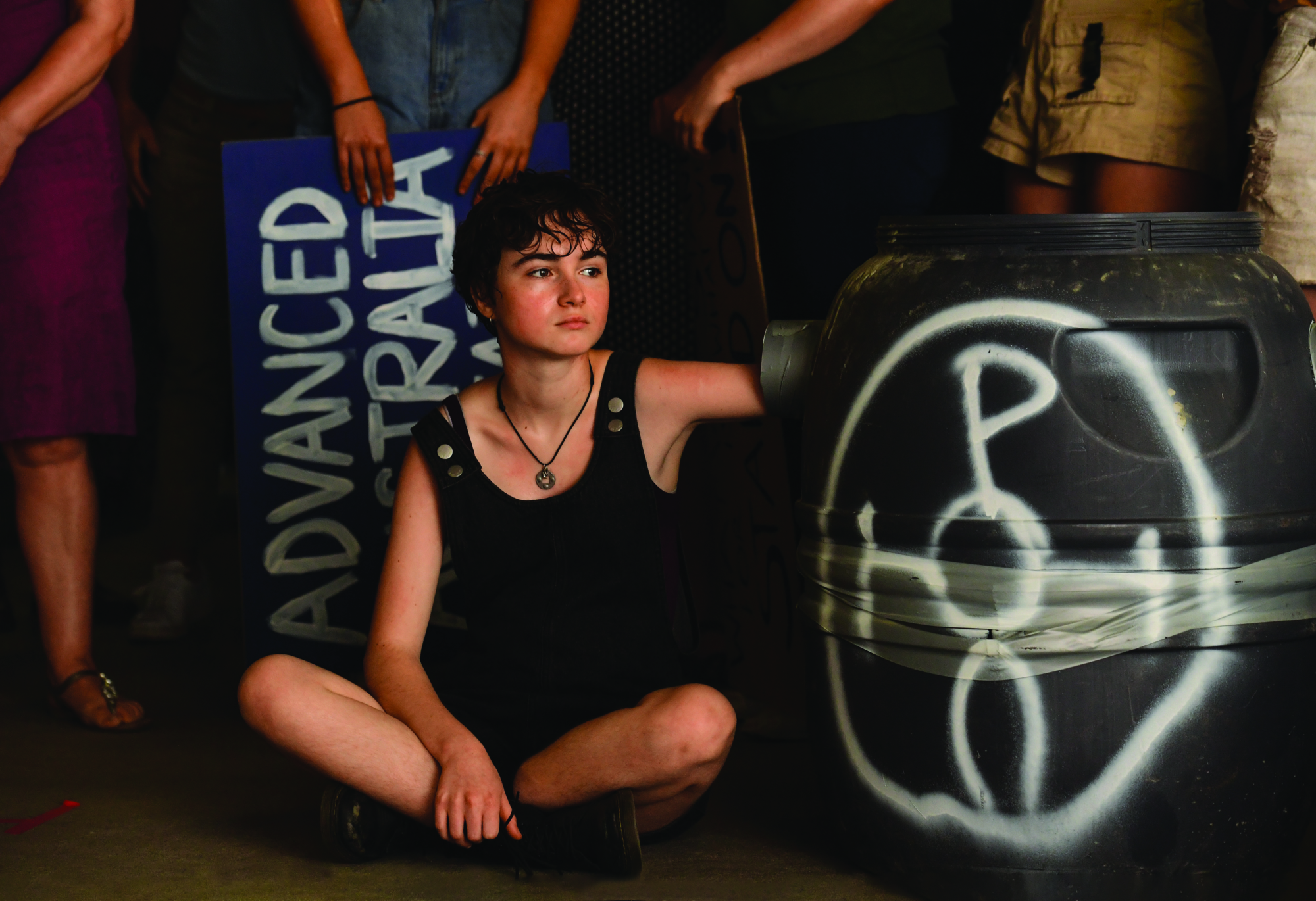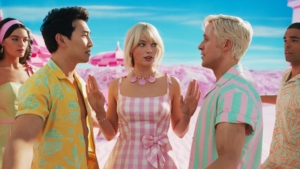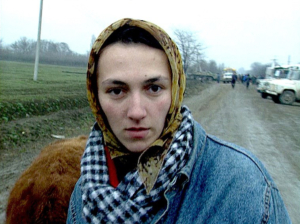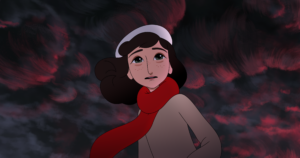Streaming service Stan’s original eight-part series The Commons, created by Shelley Birse, premiered in December 2019. A mix of sci-fi thriller and family drama, the show arrived at a pertinent time; many of the scenes depicted mirror current concerns and fears for the future, particularly as the decade began with a catastrophic bushfire season in Australia that contributed to an unprecedented national and international conversation about climate change and its effects. The series came hot on the heels of the similarly themed British series Years and Years, created by Russell T Davies, which follows a family over two decades into the future through a changing social, political and technological landscape. The Commons, however, stays within a relatively short timeframe of around two months, primarily focused on the journey of Sydney neuropsychologist Eadie (Joanne Froggatt) to become a mother in a society – and, at the micro level, a family – impacted by climate change and its knock-on effects on social structure, politics, corporatism and immigration.
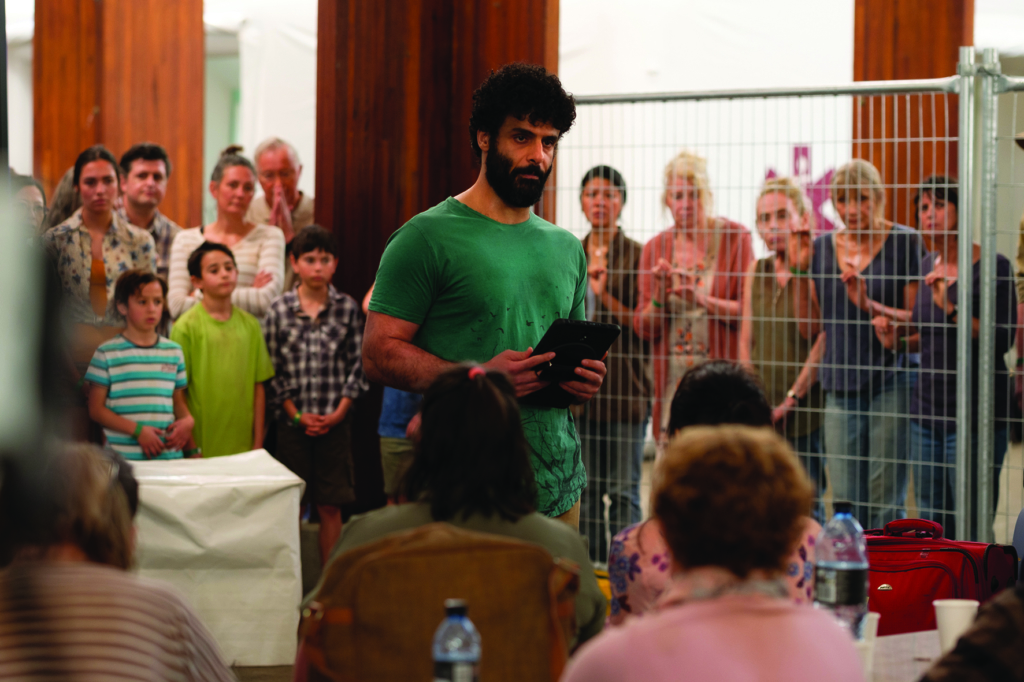
Woven though the series are instances of risk-taking, resistance and rebellion. Many of the characters make potentially perilous decisions that are driven at times by their own desires, and, at other times, pursued for the sake of their families or the greater good; likewise, the consequences of refusal to conform are explored at both personal and societal levels. Eadie’s desire for a baby and the risks she will take to make this happen form the linchpin of the story. Episode 1 begins with the loss of her pregnancy, which we learn is one of many that she has endured; she has an unspecified immune-system illness that makes her body reject embryos. Her government-sanctioned IVF journey has ended, and she cannot continue without significant financial cost – at least, not legally – but she is not willing to give up. Eadie makes the choice to risk everything, including her marriage to scientist Lloyd (David Lyons), who is unwilling to let her take the immune-suppressant drugs that may give them a baby but endanger her life, for one last chance; she says that she and her husband have different opinions on ‘how much risk [is] too much’. Her decision also embodies resistance to a system that gives women’s bodies a use-by date: dehumanising terms such as ‘date of hatch’ and ‘sub-fertile thirty-eight-plus’ are used throughout the series to talk about women’s fertility, and, when Eadie shares the news of her failed pregnancy with an online chat group, comments such as ‘babies for the rich’ and ‘back to eugenics’ appear. These sentiments are given weight when we meet her wealthy brother, Dominic (Rupert Penry-Jones), and his wife, Francesca (Simone McAullay), who have four children; Eadie’s stepdaughter, Ivy (Inez Currõ), bluntly asks, ‘Why do they have so many kids?’ Dominic offers to help Eadie financially, but she refuses, and when Lloyd also nixes the idea of her having an embryo implanted off the grid, she makes the decision to proceed with the help of his best friend and colleague, Shay (Ryan Corr).
As The Commons is set in the very near future (within a decade), much of the science and technology is less fantastical or fictional than a realistic extension of our current capabilities. A number of today’s advanced technologies have become a mainstay in the lives of the characters, including the screen on the family fridge conveying news, weather and so on; drones; and biological identification. In the words of reviewer Crystal Andrews, the characters’ reactions to scientific advances ‘reflect issues of privacy, transparency and control in the technology that’s available to us now’.[1]Crystal Andrews, ‘Why You Need to Watch The Commons: 5 Elements of the Incredible New Australian Drama’s Version of the Future That Are Scarily Realistic’, Daily Mail Australia, 24 December 2019, <https://www.dailymail.co.uk/tvshowbiz/article-7820405/Why-NEED-watch-Commons-5-elements-new-Australian-drama-scarily-realistic.html>, accessed 3 March 2020. Eadie demonstrates her resistance to the invasive nature of technology when she turns her back on a drone attempting to identify her through facial recognition, and later throws a rock at one of the machines, joyfully knocking it out of the sky. This annoyance hides a deeper resentment towards the technology used to monitor her pregnancies: an implant in her stomach that sends information to her health-insurance provider, the government, and apps on her and Lloyd’s phones. With the help of Shay, who facilitates a hack on her phone to hide her real pregnancy data, she is able to deliberately subvert this technology, albeit at great personal risk to herself and Shay.
As The Commons is set in the very near future … much of the science and technology is less fantastical or fictional than a realistic extension of our current capabilities.
In the early episodes, the ‘wow factor’ medical technology is the sensory-immersion brain-scanning equipment used by Eadie on her patients. Ben (Damon Herriman), a war veteran and border-patrol officer, is treated by Eadie with the device, which takes him to the brink of his trauma; afterwards, he can take a beta-blocker to dull the edges of the memories. Although Eadie embraces this technology as a physician, after her own immersion therapy she resists taking the beta-blocker herself, deciding instead to retain the emotional pain. As The Sydney Morning Herald’s Samantha Selinger-Morris points out, Eadie’s choice asks us to consider the ‘ramifications of neutralising our fears’, given that they are a natural protective mechanism.[2]Samantha Selinger-Morris, ‘Dystopian Climate Change Drama The Commons Will Keep You Awake at Night’, The Sydney Morning Herald, 18 December 2019, <https://www.smh.com.au/culture/tv-and-radio/dystopian-climate-change-drama-the-commons-will-keep-you-awake-at-night-20191213-p53jrk.html>, accessed 3 March 2020.
Dominic, on the other hand, seemingly embraces all that new technology has to offer, both in his state-of-the-art home and in his work as a helicopter pilot for a private company that services the basic disaster-mitigation needs (water, generators, medication) of those who can afford it. Yet he plans an escape to a simpler life off the grid, buying a self-sufficient farm outside the city, which he refers to as his family’s ‘bolthole in the bush’. He says this is so they can ‘get away from what’s coming’ – presumably referring to a worsening climate-change scenario, which he may be more privy to thanks to his political connections. Although his idyllic lifestyle appears to shield him and his family from risk, he fears losing everything.
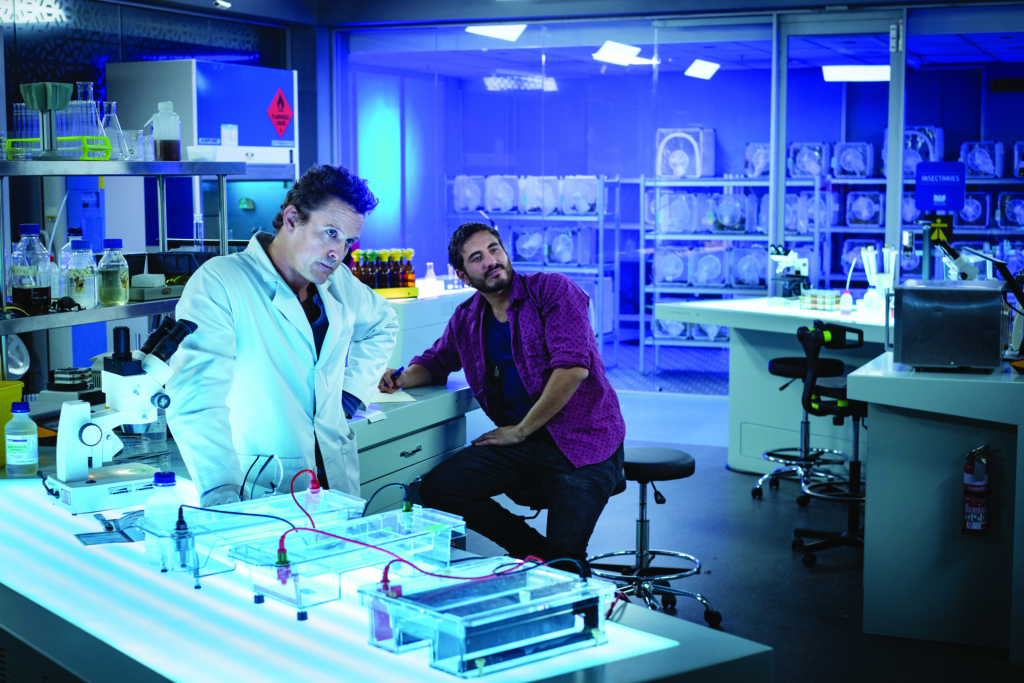
Despite Eadie and Lloyd both being professionals, they don’t want the life that Dominic and Francesca have. The latter live in an apartment block called Stonehewen, whose opulent foyer is emblazoned with the motto ‘Welcome to your Sanctuary’. Ivy’s jealousy at her cousins’ lifestyle is countered by her father, who refers to them as ‘brats’ and actively resists their hermetically sealed existence in favour of a more ‘authentic’ life of backyard barbecues and parties in local parks. Eadie shares his sentiment, describing Stonehewen as an ‘egg carton’ and their own neighbourhood as a ‘beehive’. After a heatwave allows the city’s less-privileged residents into the building’s air-conditioned foyer, it seems not so much a sanctuary as a ticking time bomb of rebellion. When a man boldly enters Dominic’s apartment, silently helping himself to the contents of the fridge, his two boys Archie (Alex Chard) and Cosmo (Bede Warnock) are at first frozen with fear before Archie retrieves his father’s gun. The incident is eerily reminiscent of JG Ballard’s novel High-Rise, foreshadowing a clash of haves and have-nots in a society wherein not just comfort, but survival, is determined by class.
Class division is thrown into sharper focus when Eadie begins national service at a refugee evacuation centre. We learn that ‘border control’ no longer refers only to national borders, as country dwellers are now being stopped from entering cities. After yet another catastrophic storm, busloads of rural refugees are brought into the centre for processing. They are subject to a number of medical tests, with those who ‘pass’ being given food, shelter and the opportunity to apply for urban residency, while those who do not are put back on the buses and returned to their impoverished regions. Climate refugees from Pacific nations such as Tonga, now underwater, are also desperately seeking shelter. Eadie is shocked to discover among their number the family of Stonehewen concierge Israel (Dominic Ona-Ariki). Despite the risks to her fragile immune system, Eadie is touched by the plight of those at the centre and eager to assist them. One of her colleagues at the centre, Abel (Fayssal Bazzi), is also willing to risk his job and resist the constraints of an unjust system to enable Eadie to help some of the refugees.
Birse has stated that she wanted to amplify the changes happening now in the climate debate, in which young people are at the forefront.
Corporatism and politics are woven into the storyline through Shay and Lloyd’s scientific work. They are working on a vaccine for the tropical Chagas virus, which, in the series, has become more prevalent in Australia due to climbing global temperatures. Although the pair work for a government agency, the National Institute of Science, the interests of pharmaceutical companies take hold as soon as they have released their research findings. When big pharma Lindriquil comes knocking, institute boss Herman (John Waters) encourages the scientists to sell their work. Lloyd concludes that his superior is ‘pimping himself out’ to corporate interests, and urges Shay to resist; however, Shay betrays him by accepting the offer after being blackmailed by shady Lindriquil executive Karima (Andrea Demetriades). The colleagues soon discover a conspiracy to use the vaccine, which they are aware can cause sterility, on refugees in order to control the population. Meanwhile, politician and fellow Stonehewen resident Carl (Felix Williamson) gives Dominic a tip-off to buy shares in the company, expressing the government’s position on the crisis: that, without a radical approach to immigration, ‘all of us are cooked […] You cannot bang on about environmental degradation and then just open the gates.’
At the evacuation centre, Eadie and Abel are caught up in the rebellion that is sparked when a policy is announced to offer extra immigration points to refugees who take the vaccine, and a lottery system is put in place to decide who receives it. Despite warnings from Eadie, Israel’s wife, Rima (Ilaisaane Green), and their children choose to take the vaccine, as she believes it is worth the risk to obtain residency and reunite her family. While this is happening, Lloyd confronts Karima, saying that there is no capacity for informed consent, and that people ‘do not knowingly risk their health or their lives for the sake of science’, to which she replies, ‘I’m running a bigger race with bigger risks.’ At the heart of his work is a desire to help others, but the inevitable government and corporate involvement demonstrates that science can be both a tool for good and a weapon. Finally, the series shifts focus from Eadie and her family to Israel, Rima and their children; the latter collectively become a symbol of injustice in a society irrevocably changed by climate destruction, as their residency visas are again refused, leaving them to face deportation.
Birse has stated that she wanted to amplify the changes happening now in the climate debate, in which young people are at the forefront: ‘It just feels like this wave of momentum has moved it off from being a fringe topic into a really mainstream thing.’[3]Shelley Birse, quoted in Wenlei Ma, ‘The Commons Feels Less like Drama and More like Prophecy’, News.com.au, 25 December 2019, <https://www.news.com.au/entertainment/tv/tv-shows/the-commons-feels-less-like-drama-and-more-like-prophecy/news-story/170740414347d7247405a60f5c655b69>, accessed 3 March 2020. The series, accordingly, taps into the zeitgeist of the Extinction Rebellion and School Strike 4 Climate movements through young Ivy’s discovery of the ‘Opt Out’ movement online, which she enlists to help expose the plight faced by Israel and Rima’s family. The group takes centre stage in a climactic clash with border officers and police, bringing a crowd of protesters into the car park of Eadie’s hospital, where two of Israel and Rima’s children are being held in a van while the couple are in the hospital with their baby. With the story quickly spreading on social media, the streets outside fill with protesters, and the government is forced into action. Lloyd’s pride at Ivy’s involvement in the protest is obvious, while border officer Ben returns to the story as well, risking his own position to help the family.
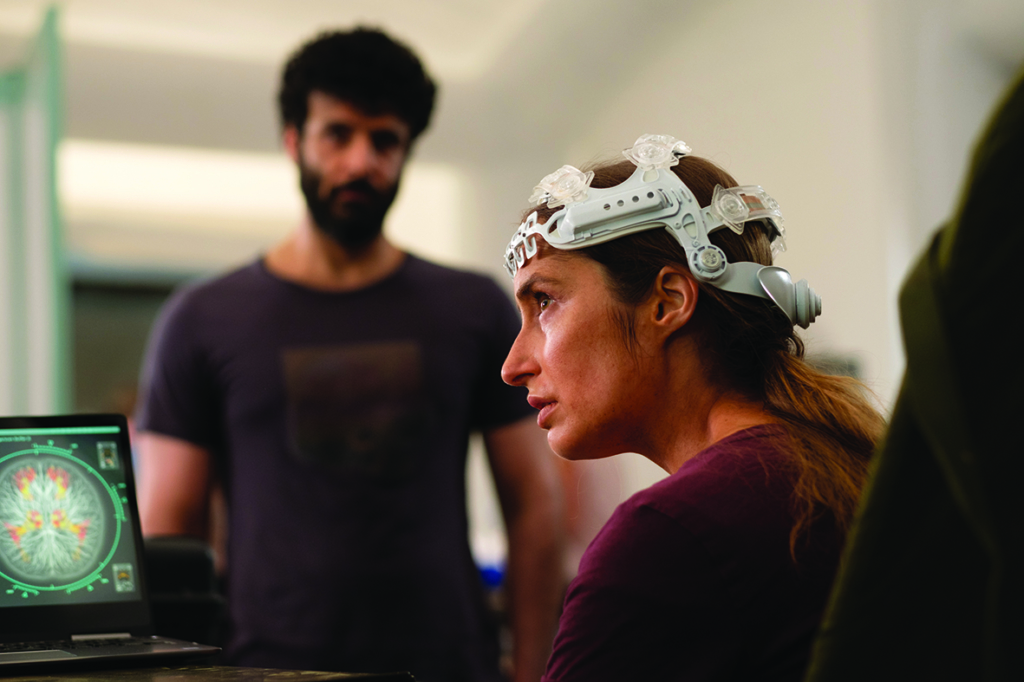
Although there are dystopian elements in The Commons, Lyons sees the series’ ‘ultimate theme’ as ‘hope and transcendence […] not misery’.[4]David Lyons, quoted in Amy Campbell, ‘As NSW Burns Around Us, New Series The Commons Feels Very Close to Home’, GQ, 20 December 2019, <https://www.gq.com.au/entertainment/film-tv/as-nsw-burns-around-us-new-series-the-commons-feels-very-close-to-home/image-gallery/08a2380a537ee7d8803f11d42a65051f>, accessed 3 March 2020. Drawing Eadie and the other key characters together as part of a much bigger event serves to remind us that there are always issues that are bigger than our own family dramas. As Birse states, the series, for her, ‘was always about the epic and the intimate’.[5]Shelley Birse, quoted in Selinger-Morris, op. cit. As well as providing a dramatic conclusion to the series, the final expression of rebellion brings with it a sense of hope: that resistance to enact change is worth the risk, and that there is power in community.
Endnotes
| 1 | Crystal Andrews, ‘Why You Need to Watch The Commons: 5 Elements of the Incredible New Australian Drama’s Version of the Future That Are Scarily Realistic’, Daily Mail Australia, 24 December 2019, <https://www.dailymail.co.uk/tvshowbiz/article-7820405/Why-NEED-watch-Commons-5-elements-new-Australian-drama-scarily-realistic.html>, accessed 3 March 2020. |
|---|---|
| 2 | Samantha Selinger-Morris, ‘Dystopian Climate Change Drama The Commons Will Keep You Awake at Night’, The Sydney Morning Herald, 18 December 2019, <https://www.smh.com.au/culture/tv-and-radio/dystopian-climate-change-drama-the-commons-will-keep-you-awake-at-night-20191213-p53jrk.html>, accessed 3 March 2020. |
| 3 | Shelley Birse, quoted in Wenlei Ma, ‘The Commons Feels Less like Drama and More like Prophecy’, News.com.au, 25 December 2019, <https://www.news.com.au/entertainment/tv/tv-shows/the-commons-feels-less-like-drama-and-more-like-prophecy/news-story/170740414347d7247405a60f5c655b69>, accessed 3 March 2020. |
| 4 | David Lyons, quoted in Amy Campbell, ‘As NSW Burns Around Us, New Series The Commons Feels Very Close to Home’, GQ, 20 December 2019, <https://www.gq.com.au/entertainment/film-tv/as-nsw-burns-around-us-new-series-the-commons-feels-very-close-to-home/image-gallery/08a2380a537ee7d8803f11d42a65051f>, accessed 3 March 2020. |
| 5 | Shelley Birse, quoted in Selinger-Morris, op. cit. |
